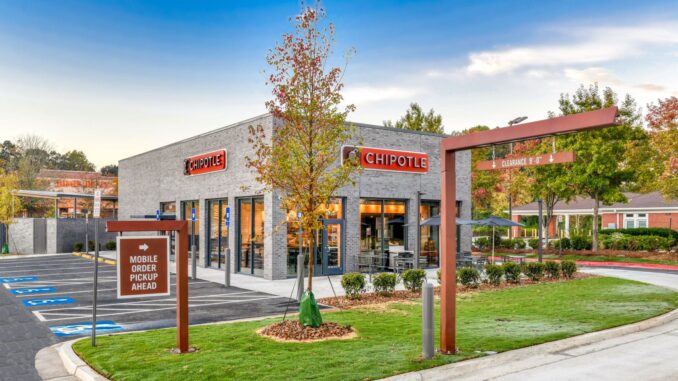
By RTN Staff - 9.27.2022
Chipotle Mexican Grill, which had over 3,000 restaurants as of June 30, 2022, in the United States, Canada, the United Kingdom, France and Germany and is the only restaurant company of its size that owns and operates all its restaurants, has reportedly begun piloting two new technologies. The technologies, which are the latest in a long line of new technologies recently implemented at Chipotle, are designed to deliver precise forecasting, optimal quality, and increased convenience for digital guests.
In select Southern California restaurants, Chipotle is piloting a cook to needs kitchen management system that provides demand-based cooking and ingredient preparation forecasts to optimize throughput and freshness while minimizing food waste. Leveraging AI and machine learning, the system monitors ingredient levels in real time and notifies the crew how much to prep, cook and when to start cooking, while automatically populating real time production planning for each restaurant.

“The new kitchen management system has alleviated manual tasks for our crew and given restaurant managers the tools they need to make informed in the moment decisions, ultimately enabling them to focus on an exceptional culinary and an outstanding guest experience,” said Curt Garner, Chief Technology Officer, who joined Chipotle in 2015 and previously served as Executive Vice President and Chief Technology Officer at Starbucks.
Chipotle’s new kitchen management system, powered by operational optimization technology solution provider PreciTaste, which last month raised $24 million in a Series A investment round, is currently being tested at eight restaurants in Orange County, California. PreciTaste’s platform, powered by Intel Solutions and leveraging the OpenVINO toolkit, analyzes real data as well as food operations simulation data to create algorithms designed to optimize performance and “accelerate deployment of intelligent devices.” The technology also reduces overhead costs and food waste by allowing restaurants to more accurately predict demand at any given time. Early results indicate the Chipotle pilot is effectively streamlining kitchen operations for crew members while always ensuring a full line of fresh ingredients for guests.

The company is simultaneously piloting advanced location-based technology to enhance its app functionality and provide a seamless, convenient experience for guests. For guests who opt-in, the program can engage with Chipotle App users upon arrival and utilizes real time data to enhance their experience with order readiness messaging, wrong pick-up location detection, reminders to scan the Chipotle Rewards QR code at checkout, and more.
“Empowering our restaurants with advanced technologies is critical for operational excellence and better positions our teams for our ambitious growth plans,” said Scott Boatright, Chief Restaurant Officer, in a press release.
Chipotle’s contextual restaurant program, utilizing Radius Networks’ technology platform, Flybuy, is currently being tested at 73 restaurants in Cleveland, Ohio. Early results indicate positive performance with improved in-store rewards engagement, order alert notifications, and efficiencies with earlier assignments for marketplace delivery drivers.
Chipotle’s autonomous kitchen assistant was introduced earlier this year, as reported here, to drive efficiencies through collaborative robotics has moved to its next stage of operational testing. Chippy, which integrates culinary traditions with artificial intelligence to make tortilla chips, was relocated from the Chipotle Cultivate Center to official installation in-restaurant. Chippy will start cooking chips for guests next month in a Fountain Valley, California location while the brand leverages its stage-gate process to listen, test and learn from crew and guest feedback before deciding on a national implementation strategy.
The robotic solution was designed by Miso Robotics, best known as maker of the first autonomous grilling and frying kitchen robot.vAccording to a press statement, Chipotle’s culinary team guided the development team at Miso in tailoring its technology “to maintain the culinary integrity of the brand.”
Chipotle, which pioneered the mobile ordering back in 2008, has rapidly grown its digital ordering capabilities in recent years to include AI-enabled phone ordering, drive-thru pickup lanes and an Amazon’s Alexa-based reordering function.  Last year, the company invested in Nuro, an autonomous delivery vehicles company, as part of their Series C funding round.
Last year, the company invested in Nuro, an autonomous delivery vehicles company, as part of their Series C funding round.
Founded in 2016, and based in Mountain View, California, Nuro uses robotics in their fleet of on-road, occupantless and autonomous vehicles to deliver consumer goods, including groceries and restaurant orders. The specialized robotic vehicle is still in its early stages of design and engineering. According to company reports, it may be several years before the the R2 will be pulling up to an address with a burrito delivery.
“We are always seeking opportunities that provide innovative solutions for increasing access and convenience for our guests,” said Garner.

